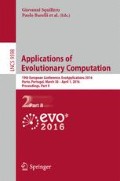Abstract
The population-based incremental learning (PBIL) algorithm is a combination of evolutionary optimization and competitive learning. The integration of PBIL with associative memory schemes has been successfully applied to solve dynamic optimization problems (DOPs). The best sample together with its probability vector are stored and reused to generate the samples when an environmental change occurs. It is straight forward that these methods are suitable for dynamic environments that are guaranteed to reappear, known as cyclic DOPs. In this paper, direct memory schemes are integrated to the PBIL where only the sample is stored and reused directly to the current samples. Based on a series of cyclic dynamic test problems, experiments are conducted to compare PBILs with the two types of memory schemes. The experimental results show that one specific direct memory scheme, where memory-based immigrants are generated, always improves the performance of PBIL. Finally, the memory-based immigrant PBIL is compared with other peer algorithms and shows promising performance.
Access this chapter
Tax calculation will be finalised at checkout
Purchases are for personal use only
References
Baluja, S.: Population-based incremental learning: A method for integrating genetic search based function optimization and competitive learning. Technical Report CMU-CS-94-163, Carnegie Mellon University, Pittsburgh, PA, USA (1994)
Larrañaga, P., Lozano, J. (eds.): Estimation of Distribution Algorithms: A New Tool for Evolutionary Computation. Kluwer, Norwell (2002)
Yang, S., Yao, X.: Population-based incremental learning with associative memory for dynamic environments. IEEE Trans. Evol. Comput. 12(5), 542–561 (2008)
Yang, S., Richter, H.: Hyper-learning for population-based incremental learning in dynamic environments. In: IEEE Congress on Evolutionary Computation 2009, CEC 2009, pp. 682–689 (2009)
Yang, S., Yao, X.: Experimental study on population-based incremental learning algorithms for dynamic optimization problems. Soft Comput. 9(11), 815–834 (2005)
Jin, Y., Branke, J.: Evolutionary optimization in uncertain environments-a survey. IEEE Trans. Evol. Comput. 9(3), 303–317 (2005)
Yang, S.: Population-based incremental learning with memory scheme for changing environments. In: Proceedings of the 7th Annual Conference on Genetic and Evolutionary Computation. GECCO 2005, 711–718. ACM, New York (2005)
Mavrovouniotis, M., Yang, S.: Population-based incremental learning with immigrants schemes for changing environments. In: Proceedings of the 2015 IEEE Symposium on Computational Intelligence in Dynamic and Uncertain Environments (CIDUE), pp. 1444–1451, December 2015
Yang, S.: Associative memory scheme for genetic algorithms in dynamic environments. In: Rothlauf, F., Branke, J., Cagnoni, S., Costa, E., Cotta, C., Drechsler, R., Lutton, E., Machado, P., Moore, J.H., Romero, J., Smith, G.D., Squillero, G., Takagi, H. (eds.) EvoWorkshops 2006. LNCS, vol. 3907, pp. 788–799. Springer, Heidelberg (2006)
Baluja, S.: An empirical comparison of seven iterative and evolutionary function optimization heuristics. Technical Report CMU-CS-95-193, Carnegie Mellon University, Pittsburgh, PA, USA (1995)
Yang, S.: Genetic algorithms with memory- and elitism-based immigrants in dynamic environments. Evol. Comput. 16(3), 385–416 (2008)
Yang, S.: Non-stationary problem optimization using the primal-dual genetic algorithm. In: The 2003 Congress on Evolutionary Computation CEC 2003. vol. 3, pp. 2246–2253, December 2003
Acknowledgement
This work was supported by the Engineering and Physical Sciences Research Council (EPSRC) of U.K. under Grant EP/K001310/1.
Author information
Authors and Affiliations
Corresponding author
Editor information
Editors and Affiliations
Rights and permissions
Copyright information
© 2016 Springer International Publishing Switzerland
About this paper
Cite this paper
Mavrovouniotis, M., Yang, S. (2016). Direct Memory Schemes for Population-Based Incremental Learning in Cyclically Changing Environments. In: Squillero, G., Burelli, P. (eds) Applications of Evolutionary Computation. EvoApplications 2016. Lecture Notes in Computer Science(), vol 9598. Springer, Cham. https://doi.org/10.1007/978-3-319-31153-1_16
Download citation
DOI: https://doi.org/10.1007/978-3-319-31153-1_16
Published:
Publisher Name: Springer, Cham
Print ISBN: 978-3-319-31152-4
Online ISBN: 978-3-319-31153-1
eBook Packages: Computer ScienceComputer Science (R0)

